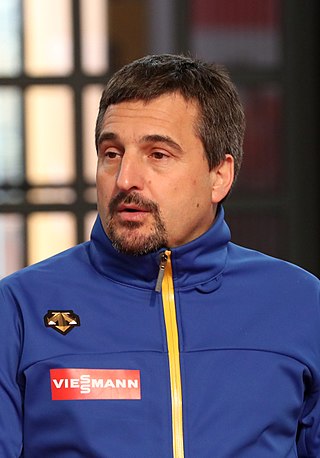
Georg Hackl, often named Hackl Schorsch, is a German former luger who was three time Olympic and World Champion. He is known affectionately as Hackl-Schorsch or as the Speeding Weißwurst, a reference to what he looks like in his white bodysuit coming down the luge at fast speeds.
The 1972 Winter Olympics, officially known as the XI Olympic Winter Games, was a winter multi-sport event held in Sapporo, Japan, from 3 to 13 February 1972. A total of 1,006 athletes representing 35 National Olympic Committees (NOCs) participated in 35 events from 10 different sports and disciplines.
The 1968 Winter Olympics, officially known as the X Olympic Winter Games, was a winter multi-sport event held in Grenoble, France, from 6 to 18 February 1968. A total of 1,158 athletes representing 37 National Olympic Committees (NOCs) participated, including first-time entrants Morocco. The games featured 35 events in 6 sports and 10 disciplines. The team relay event in biathlon was contested for the first time.

Andreas Linger is an Austrian former luger who competed internationally since 2000. He and his younger brother Wolfgang began luging at a very young age, and did their first doubles run when they were 14. Linger has won five medals at the FIL World Luge Championships with three golds and two bronzes. He also earned seven medals at the FIL European Luge Championships with a gold, three silvers, and three bronzes. The Lingers were overall Luge World Cup men's doubles champions in 2011-12 and scored 15 World Cup race victories. They were two time Olympic champions in the men's doubles event at the 2006 Winter Olympics in Turin, Italy and the 2010 Winter Olympics in Vancouver, British Columbia, Canada. They won in 2006 despite Wolfgang having broken his leg in a luge crash the previous year. In 2010, they successfully defended their gold medal against another team of brothers, Andris and Juris Šics of Latvia.
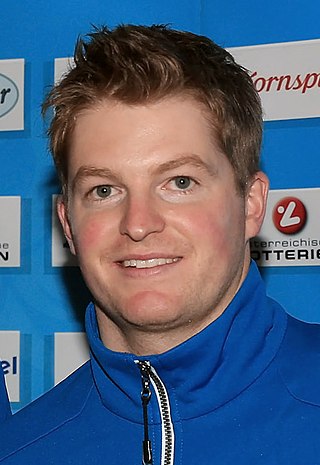
Wolfgang Linger is an Austrian former luger who competed internationally since 2000. As young children, he and his older brother Andreas learned to luge on a former Olympic luge track, and at age 14 began competing as a doubles team for the first time. Linger has won five medals at the FIL World Luge Championships with three golds and two bronzes. He also earned seven medals at the FIL European Luge Championships with a gold, three silvers, and three bronzes. The Lingers were overall Luge World Cup men's doubles champions in 2011-12 and scored 15 World Cup race victories. In 2005, he broke his leg in a crash, but the next year at the 2006 Winter Olympics in Turin, Italy won the gold medal in doubles luge. He repeated this feat at the 2010 Winter Olympics in Vancouver, Canada, defeating another team of brothers, Andris and Juris Šics of Latvia.

Gerda Weissensteiner OMRI is an Italian luger and bobsleigh pilot who competed from the late 1980s to 2006. Competing in six Winter Olympics, she won the gold medal in the women's singles luge event at the 1994 Winter Olympics in Lillehammer, and together with Jennifer Isacco she won the bronze in Turin in the two-woman bobsleigh at the 2006 Winter Olympics. She was the first Italian sportsperson to win Olympic medals in two disciplines.

Oswald Haselrieder OMRI is an Italian former luger who competed internationally from 1988 to 2010. He achieved success at junior level, taking two bronze medals in singles and a gold in doubles at the World Junior Championships, the latter achieved in partnership with Dietmar Pierhofer. Haselrider and Pierhofer continued to compete together until 1995, when they split up and Haselrieder joined forces with Gerhard Plankensteiner. Haselrieder went on to win the bronze medal in the men's doubles event at the 2006 Winter Olympics in Turin after competing in three previous Winter Olympic Games: in 1992 in the singles event and in doubles in 1998 and 2002. He went on to compete in a fifth Olympics in 2010: he retired soon afterwards after sustaining an injury in training in March of that year.
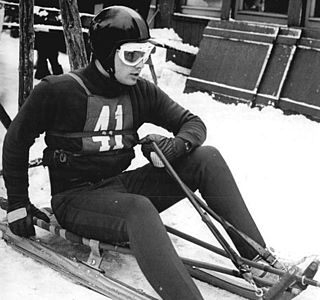
Klaus Bonsack, also known as Klaus-Michael Bonsack, was an East German luger who competed during the 1960s and early 1970s.
Manfred Schmid is an Austrian former luger who competed from the mid-1960s to the late 1970s. Competing in four Winter Olympics, he won two medals at Grenoble in 1968 with a gold in the men's singles event and a silver in the men's doubles event.
Paul Hildgartner is an Italian former luger who competed from the early 1970s to the late 1980s. Competing in five Winter Olympics, he earned two gold medals and one silver medal for his efforts. Hildgartner was the flag bearer for Italy in the 1984 Winter Olympics and the 1988 Winter Olympics opening ceremonies.

Susi-Lisa Erdmann is an East German-German luger and bobsledder who competed from 1977 to 1998 in luge, then since 1999 in bobsleigh. She was born in Blankenburg, Bezirk Magdeburg. Competing in five Winter Olympics, she won two medals in the women's singles luge event with a silver in 1994 and a bronze in 1992, and a bronze at the inaugural two-women bobsleigh event in 2002. She is one of only two people to ever win a medal in both bobsleigh and luge at the Winter Olympics; Italy's Gerda Weissensteiner is the other.
Josef Feistmantl was an Austrian luger who competed from the mid-1950s to the early 1970s. He competed at three Olympic Games.
Fritz Nachmann is a West German former luger who competed during the 1950s and the 1960s. He was born in Kreuth. He won the bronze medal in the men's doubles event at the 1968 Winter Olympics in Grenoble. Nachmann also won five medals at the FIL World Luge Championships with four medals in men's doubles and one medal in men's singles. He also won a silver medal in the men's singles event at the 1967 FIL European Luge Championships in Königssee, West Germany.
Paul Aste was an Austrian bobsledder and luger who competed during the 1950s and the 1960s. He also took the Olympic Oath for athletes at the 1964 Winter Olympics in Innsbruck.
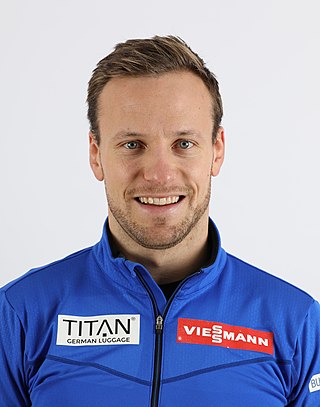
Tobias Arlt is a German luger, acting as a backdriver. He won a silver medal in the men's doubles event at the 2008 FIL World Luge Championships, a silver and a bronze at the 2010 FIL European Luge Championships, a gold medal at the FIL World Luge Championships 2013, and two gold medals at his debut Olympics, the 2014 Winter Olympics in Sochi.
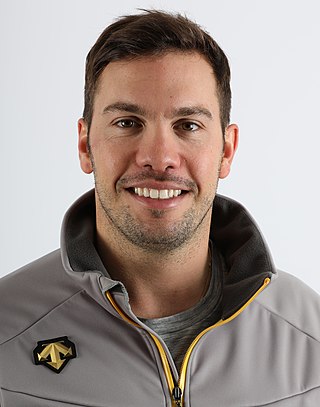
Tobias Wendl is a German luger who has competed since 1993, acting as a front. He won a silver medal in the men's doubles event at the 2008 FIL World Luge Championships in Oberhof, Germany, a silver and a bronze at the FIL European Luge Championships 2010 in Sigulda, a gold at the FIL World Luge Championships 2013, and two gold medals at his debut Winter Olympics at the 2014 Winter Olympics in Sochi. He is also a Master Sergeant in the German Army.
The luge competition events of the 2010 Winter Olympics were held between 13 and 17 February 2010 at the Whistler Sliding Centre in Whistler, British Columbia, Canada.
The men's luge at the 2010 Winter Olympics took place on 13–14 February 2010 at the Whistler Sliding Centre in Whistler, British Columbia. Germany's Felix Loch was the two-time defending world champion and won the gold medal with the fastest time in each of the four runs. The test event that took place at the venue was won by Germany's David Möller, who would win the silver medal in this event. Italy's Armin Zöggeler was the two-time defending Olympic champion and won a bronze medal in this event. The last World Cup event prior to the 2010 games took place in Cesana, Italy on 30 January 2010 and was won by Zöggeler, who also won the overall World Cup title.
The doubles luge event at the 2010 Winter Olympics was held on 17 February at the Whistler Sliding Centre in Whistler, British Columbia. Twenty teams participated. Austrian brothers Andreas and Wolfgang Linger, the defending Olympic and European champions, won the gold medal. The silver medal was also won by a pair of brothers, Andris and Juris Šics of Latvia. Germans Patric Leitner and Alexander Resch clinched the bronze medal after edging out Italians Christian Oberstolz and Patrick Gruber, who were in third place after the first run.









